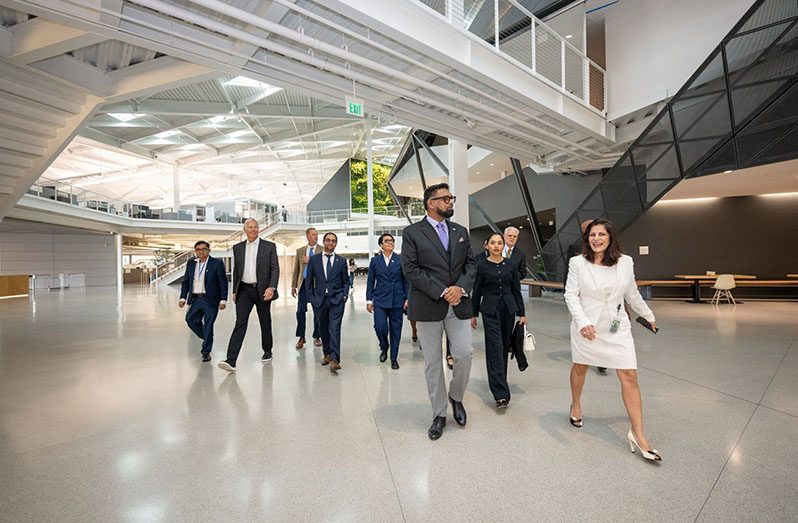–President Ali says
PRESIDENT, Dr Irfaan Ali has stated that Artificial Intelligence (AI) holds great potential in addressing global food insecurity, noting that predictive technology and precision agriculture could enable smarter farming practices.
He made this remark while delivering the keynote address at the Spring 2025 Berkeley Innovation Forum in California, United States. Recognising the challenges of the present day, President Ali emphasised that AI is on the brink of ushering in a new era that could redefine human civilisation. He also highlighted that the Fifth Industrial Revolution (5IR), centred on human-AI collaboration, may arrive sooner than anticipated.
The forum is themed, ‘‘Making AI Sovereign: Bridging Geopolitical Divides for Open Solutions.”
“AI ethically deployed for the common good can help us address global food security, it can help us find solutions to optimise agricultural production, reduce food spoilage and waste and improve supply-chain efficiency through predictive analytics, AI can forecast weather patterns, detect crop diseases early and recommend precise irrigation and fertilisation strategies.
“By integrating AI into food systems, we can create a more resilient, productive and sustainable global food-supply chain,” the Guyanese Head of State said.

Food security is closely linked to climate resilience and as President Ali highlighted, in order for food insecurity to be stamped out, it is key to adopt certain technologies among other elements that could improve productivity and mitigate environmental impacts.
Additionally, President Ali underscored that AI deployed for the common good can be a powerful tool in the fight against climate change by enhancing climate modelling, optimising energy use and promoting sustainable practices.
Guyana has been a vocal advocate for the establishment of a global market mechanism to enhance the value of carbon credits and leverage them as a significant revenue source. This call is rooted in the country’s proactive efforts to monetise its vast forest resources, which serve as vital carbon sinks, while promoting sustainable development and combatting climate change.
At international fora such as COP28, Guyana had urged world leaders to advance discussions on Article Six of the Paris Agreement, which pertains to market mechanisms for carbon trading. A robust global framework could stabilise carbon credit prices and incentivise greater participation from both buyers and sellers. This has been a recurring call by Guyana at different fora across the world.
Guyana is being guided by its Low-Carbon Development Strategy (LCDS) 2030, which is an expanded and renewed framework for the country’s sustainable development through the year 2030. This strategy builds upon the original LCDS launched in 2009.
“AI-driven analytics can take extreme weather events, monitor deforestation and optimise energy grids for greater efficiency. It can be that important monitoring and evaluation tool. It can be that tool that identifies for us, risk in a predictive manner, but importantly, it is that tool that can hold us to accountability,” Dr Ali said.
It has been reported that smart agriculture, powered by AI, can reduce water and fertiliser wastage, while AI-driven circular economy models can minimize industrial emissions. President Ali also underscored the deep scars that the COVID-19 pandemic left on many economies, exacerbating structural inequalities.
Reports also indicate that the devastating impacts of climate variability and extreme events—droughts, storms, and floods—now affect 74 per cent of countries in the region with increasing frequency.
Vulnerable populations have faced the brunt of these disruptions as these challenges not only affect food productivity but also drive up food prices, limit availability and compromise the stability of agrifood systems.



.jpg)








